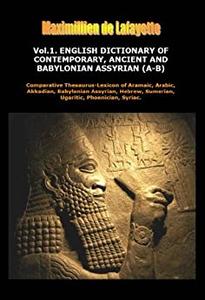
Free Download ENGLISH DICTIONARY OF CONTEMPORARY, ANCIENT AND BABYLONIAN ASSYRIAN by Maximillien de Lafayette
English | March 17, 2013 | ISBN: N/A | ASIN: B00BW7KAMS | 298 pages | EPUB | 3.63 Mb
ENGLISH DICTIONARY OF CONTEMPORARY, ANCIENT AND BABYLONIAN ASSYRIAN
Comparative Thesaurus-Lexicon of Aramaic, Arabic, Akkadian, Babylonian Assyrian, Hebrew, Sumerian, Ugaritic, Phoenician, Syriac. Including Translation of Sumerian & Assyrian Tablets.
Samples of words' definitions.
Anum "Anuum": Akkadian/Sumerian/Babylonian Assyrian.
Noun. Name of the Anunnaki's god Anu.
*An in Sumerian.
*An in Akkadian.
*An in Chaldean.
*Anu in Egyptian.
*Also Anu in ancient Assyrian.
Anum was the creator of the gods, including the peoples of the earth, but over time (3000-2500 B.C.) Anum lost his privileged position to his son Enlil.
His main temple was in Uruk, where he was worshipped as god of that city.
Later on, his daughter Inanna became a co-god of Uruk. Anum mated with the goddesses Ki and Nammu. His union with them gave birth to the gods.
In Sumerian, "An" means:
* Sky.
* High.
The word "An" was commonly used by Hurrians, Phoenicians, Elamites, Subarians, Sumerians, Akkadians, Medes, and Kasites.
Apkalu: Ancient Assyrian/Sumerian. Noun.
Name of the wise man who was sent to Earth by god Ea to teach mankind wisdom and knowledge. Babylonian mythology history tells us that there were seven Apkallu who lived on Earth since its creation, and the beginning of time. These sage men are depicted as human beings with wings. Some have an eagle head; others don't have wings and appear dressed in a sea-fish skin. Some were poets and writers who composed the epics of Erra and Gilgamesh, others were ministers to the god Ea.
Links are Interchangeable - Single Extraction
